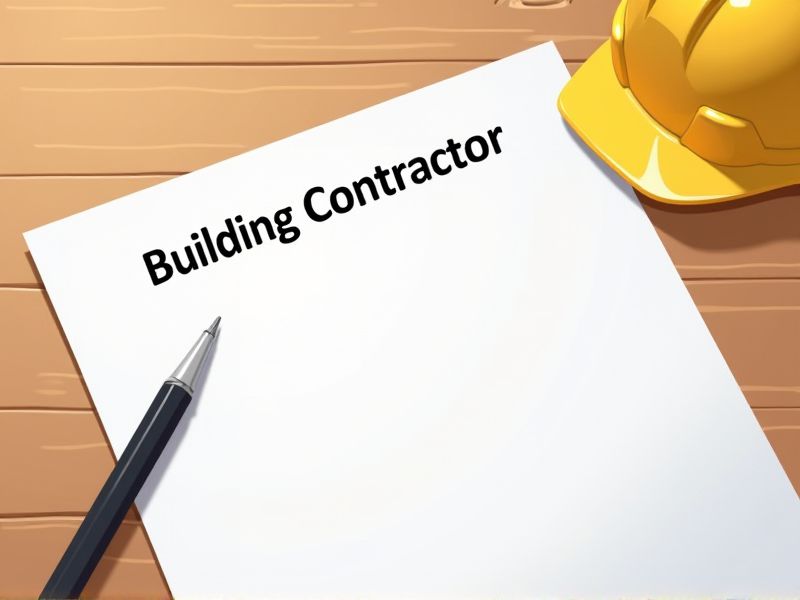
Building contractors play a pivotal role in ensuring construction projects are executed efficiently and safely. Obtaining certain certifications is essential as they validate the contractor's expertise and adherence to industry standards. These credentials help mitigate risks and ensure compliance with regional regulations and safety codes. Below are crucial certifications required for a building contractor.
General Contractor License
A General Contractor License is required for building contractors to ensure they meet specific regulatory standards that guarantee safety and quality in construction projects. This license establishes the contractor's legal authority to oversee and execute construction activities, ensuring compliance with local building codes and regulations. It also serves as a validation of the contractor's expertise and competency, safeguarding property owners from potential liabilities or substandard work. The licensure process enhances consumer trust and protects the public from fraudulent or unqualified contractors.
Building Contractor License
A building contractor license serves as legal validation, ensuring that a contractor meets the necessary standards and qualifications to undertake construction projects. Without a license, contractors are liable to face penalties and legal ramifications, which can significantly disrupt business operations. The license also builds consumer trust, as it assures clients that the contractor adheres to industry regulations and quality standards. Many regions mandate licensure to prevent unethical practices and to protect the public from substandard construction work.
OSHA 30-Hour Construction Safety Certification
Having an OSHA 30-Hour Construction Safety Certification ensures building contractors understand essential safety regulations, which can reduce workplace accidents and injuries. A certified contractor is more likely to identify potential hazards on a construction site, promoting a safer working environment. The certification can also enhance the contractor's credibility with clients and regulatory bodies, fostering trust and business growth. Promoting safety awareness and compliance can lead to fewer legal and financial repercussions for violations.
Certified Construction Manager (CCM)
A Certified Construction Manager (CCM) ensures projects adhere to timelines and budgets, reducing the risk of costly delays. This certification showcases verified expertise, enhancing credibility with clients and stakeholders. The presence of a CCM often leads to more efficient project coordination, minimizing errors and improving overall quality. Many industry regulations and standards require or prefer a CCM for compliance and assurance purposes.
LEED Accredited Professional (LEED AP)
Achieving LEED AP credentials equips building contractors with expert knowledge of green building practices, helping them meet increasing demand for sustainable construction. It enhances their credibility in the industry, often leading to more business opportunities as clients seek environmentally responsible partners. Projects aiming for LEED certification benefit from having a LEED AP on board, as they can streamline the certification process and improve project outcomes. Building contractors with LEED AP credentials are also better positioned to adhere to evolving regulatory requirements emphasizing environmental sustainability.
Project Management Professional (PMP)
Obtaining a Project Management Professional (PMP) certification equips building contractors with a standardized framework and best practices, improving project efficiency and communication. By enhancing resource management skills, contractors can minimize cost overruns and schedule delays, leading to more predictable and profitable outcomes. The PMP credential elevates a contractor's credibility, often making them more competitive in bidding for projects. It also fosters risk management proficiency, enabling the contractor to identify potential pitfalls early and implement strategies to mitigate them.
Certified Professional Constructor (CPC)
A Certified Professional Constructor (CPC) is essential for building contractors because it demonstrates a verified level of expertise and comprehensive understanding of construction management principles. Hiring a CPC often leads to more efficient project management, which can reduce costs and minimize delays. Possession of the CPC credential can enhance a contractor's reputation, making them more competitive in the marketplace. It assures clients and stakeholders of adherence to industry standards and ethical practices, reducing the risk of legal and safety issues.
Certified Safety Professional (CSP)
Obtaining a Certified Safety Professional (CSP) credential ensures a building contractor adheres to industry-leading safety standards, decreasing the likelihood of workplace accidents. Improved safety records often lead to reduced insurance premiums and associated costs for contractors. CSP certification demonstrates a contractor's commitment to safety, enhancing reputation and trust among clients and stakeholders. It also helps navigate and comply with complex safety regulations, mitigating potential legal liabilities.
Construction Estimating Certification (CEC)
Obtaining a Construction Estimating Certification equips building contractors with precise cost estimation skills, leading to more accurate project budgeting and financial planning. This certification enhances credibility, often resulting in greater trust from clients and stakeholders, which can increase business opportunities and client retention. Certified contractors are typically more adept at minimizing resource wastage and optimizing project costs, directly impacting profit margins. As many competitive markets prioritize certified professionals, possessing a CEC can provide a significant edge over uncertified peers.
Building Information Modeling (BIM) Certification
Building Information Modeling (BIM) certification equips contractors with standardized skills, leading to more efficient project management and execution. BIM-certified contractors typically experience fewer conflicts and delays, as they can better anticipate design inconsistencies before construction begins. Clients and stakeholders often prefer certified professionals because they demonstrate a commitment to quality and up-to-date technology. Possessing a BIM certification can potentially enhance a contractor's credibility and competitiveness in the bidding process.
Summary
By earning certifications, you'll likely boost your credibility and reputation within the construction industry. This often leads to increased trust from potential clients and a higher likelihood of securing more projects. Certified skills can also enable you to deliver higher quality work, which can result in positive client testimonials and referrals. Over time, these factors may contribute to a greater market share and business growth in a competitive field.
